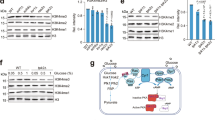Abstract
Aerobic glycolysis has been commonly linked to cell proliferation, especially in cancer cells where it serves to generate sufficient energy and biosynthesis of new cell constituents needed for cell growth and division. The M2 isoform of pyruvate kinase (PKM2) catalyzes the last reaction of the glycolytic process. PKM2 promotes the transfer of a phosphate group from phosphoenolpyruvate (PEP) to ADP, generating ATP and releasing pyruvate. This rate-limiting reaction relies therefore on the enzymatic activity of PKM2. The switching between the high- and low-activity states of PKM2 is subjected to a combination of allosteric mechanisms and fine-tuned regulation by oncogenes and tumor suppressor genes. These regulatory mechanisms involve primarily post-translational modifications of PKM2. Recent findings suggest that phosphorylation contributes to the regulation of PKM2 activity.
Here, we describe an in vitro kinase assay we used to assess PKM2 phosphorylation by c-Jun N-terminal kinase (JNK), a master regulator of apoptosis, cell proliferation, and differentiation. While the use of phospho-specific antibodies gives information in terms of measuring the effects of a given kinase on its substrate, specific antibodies for newly identified phospho-groups are not readily available. The in vitro kinase assay allows the immediate measuring of phosphorylation of any substrate of interest. Although there are several options that do not use radioactive materials, we continue to rely on this biochemical method for robust quantitation of results. More interestingly, this protocol can be easily adapted to measure the activity of other kinases by using their specific substrates.
Access this chapter
Tax calculation will be finalised at checkout
Purchases are for personal use only
Similar content being viewed by others
References
Zhu J, Thompson CB (2019) Metabolic regulation of cell growth and proliferation. Nat Rev Mol Cell Biol 20:436–450
Vander Heiden MG, Cantley LC, Thompson CB (2009) Understanding the Warburg effect: the metabolic requirements of cell proliferation. Science 324:1029–1033
Bubici C, Papa S (2019) Editorial: the Warburg effect regulation under siege: the intertwined pathways in health and disease. Front Cell Dev Biol 7:80
Riganti C, Gazzano E, Polimeni M, Aldieri E, Ghigo D (2012) The pentose phosphate pathway: an antioxidant defense and a crossroad in tumor cell fate. Free Radic Biol Med 53:421–436
Israelsen WJ, Vander Heiden MG (2015) Pyruvate kinase: function, regulation and role in cancer. Semin Cell Dev Biol 43:43–51
Papa S, Choy PM, Bubici C (2019) The ERK and JNK pathways in the regulation of metabolic reprogramming. Oncogene 38:2223–2240
Hitosugi T, Kang S, Vander Heiden MG, Chung TW, Elf S, Lythgoe K et al (2009) Tyrosine phosphorylation inhibits PKM2 to promote the Warburg effect and tumor growth. Sci Signal 2:ra73
Yang W, Zheng Y, Xia Y, Ji H, Chen X, Guo F et al (2012) ERK1/2-dependent phosphorylation and nuclear translocation of PKM2 promotes the Warburg effect. Nat Cell Biol 14:1295–1304
Lepore A, Choy PM, Lee NCW, Carella MA, Favicchio R, Briones-Orta MA et al (2021) Phosphorylation and stabilization of PIN1 by JNK promote intrahepatic cholangiocarcinoma growth. Hepatology 74:2561–2579
Iansante V, Choy PM, Fung SW, Liu Y, Chai JG, Dyson J et al (2015) PARP14 promotes the Warburg effect in hepatocellular carcinoma by inhibiting JNK1-dependent PKM2 phosphorylation and activation. Nat Commun 6:7882
Barbarulo A, Iansante V, Chaidos A, Naresh K, Rahemtulla A, Franzoso G et al (2013) Poly(ADP-ribose) polymerase family member 14 (PARP14) is a novel effector of the JNK2-dependent pro-survival signal in multiple myeloma. Oncogene 32:4231–4242
Kruger NJ (1994) The Bradford method for protein quantitation. In: Walker JM (eds) basic protein and peptide protocols. Methods Mol Biol 32:9–15
Kielkopf CL, Bauer W, Urbatsch IL (2021) Sodium dodecyl sulfate-polyacrylamide gel electrophoresis of proteins. Cold Spring Harb Protoc 12. https://doi.org/10.1101/pdb.prot102228
Acknowledgments
The authors acknowledge the research funding from Blood Cancer UK (17014 to CB and SP), the Kay Kendall Leukaemia Fund (KKL1361 to CB and SP), and Leukaemia & Myeloma Research UK (ref. 122498 to SP). FNK is sponsored by the Republic of Turkey Ministry of National Education Scholarship (MEB1416). Figures were created modifying illustrations provided by Servier (https://smart.servier.com) under Creative Commons Attribution 3.0 Unported License.
Author information
Authors and Affiliations
Corresponding author
Editor information
Editors and Affiliations
Rights and permissions
Copyright information
© 2023 The Author(s), under exclusive license to Springer Science+Business Media, LLC, part of Springer Nature
About this protocol
Cite this protocol
Kaci, F.N., Lepore, A., Papa, S., Bubici, C. (2023). Screening Kinase-Dependent Phosphorylation of Key Metabolic Reprogramming Regulators. In: Papa, S., Bubici, C. (eds) Metabolic Reprogramming. Methods in Molecular Biology, vol 2675. Humana, New York, NY. https://doi.org/10.1007/978-1-0716-3247-5_16
Download citation
DOI: https://doi.org/10.1007/978-1-0716-3247-5_16
Published:
Publisher Name: Humana, New York, NY
Print ISBN: 978-1-0716-3246-8
Online ISBN: 978-1-0716-3247-5
eBook Packages: Springer Protocols




